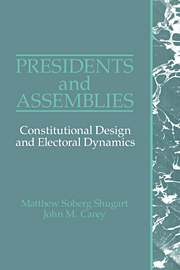Book contents
- Frontmatter
- Contents
- List of tables and figures
- Acknowledgments
- 1 Basic choices in democratic regime types
- 2 Defining regimes with elected presidents
- 3 Criticisms of presidentialism and responses
- 4 The premier-presidential and president-parliamentary experiences
- 5 The constitutional origins of chief executives
- 6 Constitutional limits on separate origin and survival
- 7 Legislative powers of presidents
- 8 Assessing the powers of the presidency
- 9 Electoral dynamics: efficiency and inefficiency
- 10 Electoral rules and the party system
- 11 Electoral cycles and the party system
- 12 Electoral cycles and compatibility between president and assembly
- 13 Conclusions
- Appendix A Electoral rules for one-seat districts and coalition-building incentives
- Appendix B Theoretical explanation for models predicting number of parties in presidential systems
- Bibliography
- Index
6 - Constitutional limits on separate origin and survival
Published online by Cambridge University Press: 05 June 2012
- Frontmatter
- Contents
- List of tables and figures
- Acknowledgments
- 1 Basic choices in democratic regime types
- 2 Defining regimes with elected presidents
- 3 Criticisms of presidentialism and responses
- 4 The premier-presidential and president-parliamentary experiences
- 5 The constitutional origins of chief executives
- 6 Constitutional limits on separate origin and survival
- 7 Legislative powers of presidents
- 8 Assessing the powers of the presidency
- 9 Electoral dynamics: efficiency and inefficiency
- 10 Electoral rules and the party system
- 11 Electoral cycles and the party system
- 12 Electoral cycles and compatibility between president and assembly
- 13 Conclusions
- Appendix A Electoral rules for one-seat districts and coalition-building incentives
- Appendix B Theoretical explanation for models predicting number of parties in presidential systems
- Bibliography
- Index
Summary
We turn now exclusively to regimes with single-person, separately elected presidencies. While separation of the origin and survival of the executive from the legislative branch was seen by the authors of The Federalist as imperative, the notion of checks and balances implied to them some overlap of functions, even to the extent that the Federalists did not see Senate “advice and consent” in the president's cabinet appointments as a violation of the principle of separate powers. Among presidential systems, however, this provision is rare: Complete separation of the origin of executive office from the assembly is the norm. There are many other regimes, such as the president-parliamentary systems, however, in which the principle of separate survival is obviated.
In this chapter, we shall consider three means by which separation of origin and survival has been limited in some systems:
assembly involvement in the appointment of cabinet ministers,
censure of cabinet ministers by the assembly, and
dissolution of the assembly by the president.
The latter two attributes, in particular, can entail sharp deviations from the Madisonian ideal that each branch, secure in its independence, will without hesitation check the other in the lawmaking process. Yet it can be argued that the possibility of both censure and dissolution encourages cooperation between branches, as each anticipates the likely reaction of the other to its actions.
- Type
- Chapter
- Information
- Presidents and AssembliesConstitutional Design and Electoral Dynamics, pp. 106 - 130Publisher: Cambridge University PressPrint publication year: 1992
- 1
- Cited by



